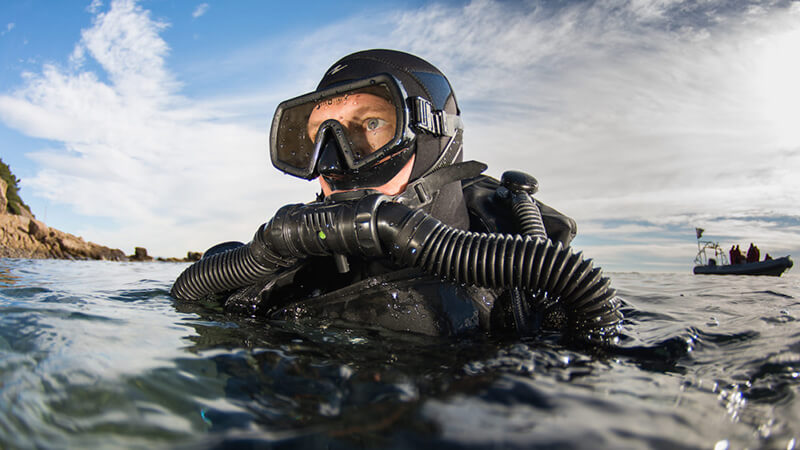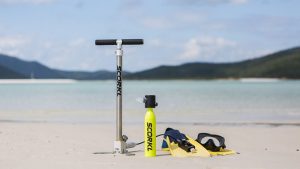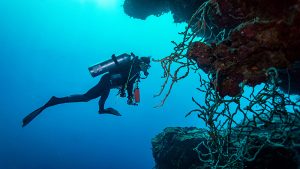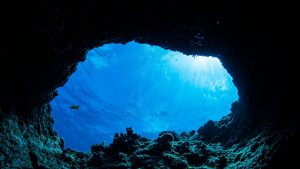How deep can a human dive with scuba gear? Many people seek to find the answer to this question at one time or another.
And it is not a question that newbie divers ask, because every diver wants to know just how deep under they can go without exposing themselves to too much risk.
With the definition of a deep dive as given by PADI being at least 18 meters, and that is quite deep as it is almost 60 feet, well, we cannot help wondering just how deep you can go safely.
I once saw a documentary of a free diver who would dive to the bottom of the ocean without scuba gear for diving or any equipment at all, no wetsuit for diving, no scuba mask. While that may be fiction, it only shows just how much will power the humans can summon when they want to test the walls of normalcy.
Unfortunately, there is not one single straight answer to the question of how deep you should dive. The reason is that there are many factors to bear in mind. Firstly, you need to think about air, and then you have think about the nitrogen buildup in your body.
Best diving depth – according to experts
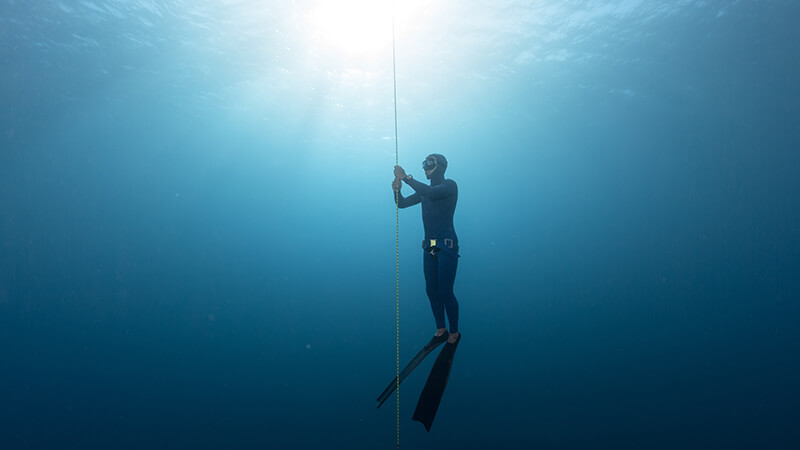
It is said that a well trained diver, with the right equipment and air supply should never descend beyond 130 feet. If they should, then their bodies can build up the nitrogen levels beyond what they can tolerate.
However, that notwithstanding, many professional divers have been known to dive for even more than 1000 feet. You are advised not to attempt this feat though because even at 130 feet, there are many physical dangers associated with the adventure.
You can only carry so much air with you. When you dive to a depth of about 30 feet, you can stay under water for more than 2 hours and explore a lot. This would give you an opportunity to shoot awesome underwater videos with your underwater camera. Of course, the time you stay under water at 30 or 40 feet of diving depth will depend on how big a scuba tank you have with you.
The deeper you go under the water the more the compression and so the air you carry with you is compressed much farther to match the pressure of the water.
This reduces your air and anyway, it has been ascertained that under water, you breathe about 4 times faster when you are at a depth of 100 to 140 feet as compared to when you are at a depth of 40 feet. This therefore means that your air will deplete faster, giving you an estimated 10 minutes to explore things.
But with the right scuba diving gear, which would be very expensive, a technical/professional diver can dive to more than 1000 feet, stay down for more than 10 hours and then come back up slowly so that they allow their body tissues to decompress and release the nitrogen trapped in the body.
As demonstrated some time back by Egyptian Lieutenant-colonel Ahmed Gabr who dived to 1090 feet, stayed 14 hours and then came up. In that endeavor, he had used more than 60 tanks of different types of diving gases. Thus, you can see just how expensive it would be to take such a dive.
Nitrogen narcosis
This is one of the first diving dangers that you are going to experience when you dive too deep. It s the feeling of drunkenness or drowsiness that comes when you breathe compressed air. Some say it is an enjoyable feeling, but if left too long unattended, it could kill you. Besides, when narcosis alters your consciousness while you are deep under water, you could end up not coming up again. You do not want that to happen.
Nitrogen narcosis starts at 100 feet of water. The weight of the water by then is too much. Thus, you have to breathe air that is at the same pressure as the water. This means that you breathe in more air, thus more nitrogen. The body does not require this at all, but it all the same has its effects.
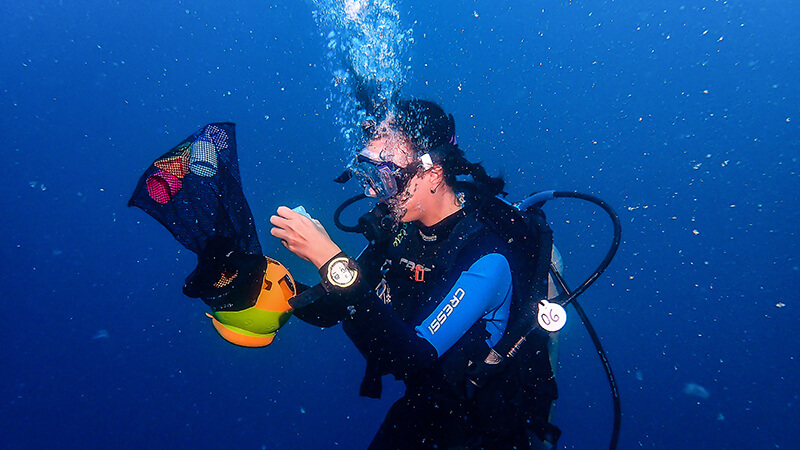
Being an inert gas, nitrogen will be absorbed by the fatty tissues very fast. Now, the brain and the nervous system have a lot of fatty tissue. When you breathe compressed air, the two of them are affected to such an extent that the victim experiences drowsiness or loss of consciousness under the water.
There is no standard depth at which you can start feeling the effects of narcosis. It is best to time yourself and know how your body reacts. Some divers can dive past 60 meters without suffering from narcosis.
Others can start feeling the effects of Narcosis in as minimal as 20 meters or even less. So it is always good to know your level of vulnerability.
The good thing is that as soon as you ascend, the effects of narcosis drop immediately and there are no after effects at all.
How deep can a human dive without scuba gear?
This is another controversial topic. You see, it is not recommended to dive without your gear.
Also called free diving, many people have attempted this and there are many incredible records. For example, one free diving enthusiast did an impressive 328 feet down. Well, in this case, the diver was well trained, and he was in a competition.
At 300 feet, the water would slow the heart, squeeze the lungs and shrink your blood vessels. It would also cause narcosis as we explained in the section before this.
A technical free diver would take about 5 minutes or less to complete such a dive. However, it is recommended that you do not attempt such as it is very risky.
How deep can a human dive before being crushed?
With just the personal diving gear, it is hard to say just how deep a diver can dive without being crushed. However, we know for sure that the 1000 mark has been reached and surpassed by many people. We also know they came back up alright and sound.
It is said that divers of a French water exploration company have reached a depth of 1752 feet of diving. That was some years back. Whether this mark has been passed, we do not know yet.
The main worry is not that you will be crushed by the weight of the water. Rather, it is that your lungs could be squeezed lifeless. There is the big risk of nitrogen narcosis since you will not be taking the decompression break. Your blood vessels would be at the risk of shrinking.
When you have been certified to dive as an open water diver (usually the first certification), you can only dive a depth of 60 feet, or 18 meters. You can train further and get certification as Advanced Open Water Diver. After that, you can dive to up to 30 meters or 100 feet.
But with more training and practice, you may even be certified to dive deeper. You can even go up to 130 feet (40 meters) or even 165 feet. However, this is just about the limit for any recreational diver, even the very advanced ones.
You will also require to take with you special gases. These have a special formula to help your body beat nitrogen narcosis. This is very important, considering the fact that you will have no decompression break at this depth.
How deep can you dive without decompression?
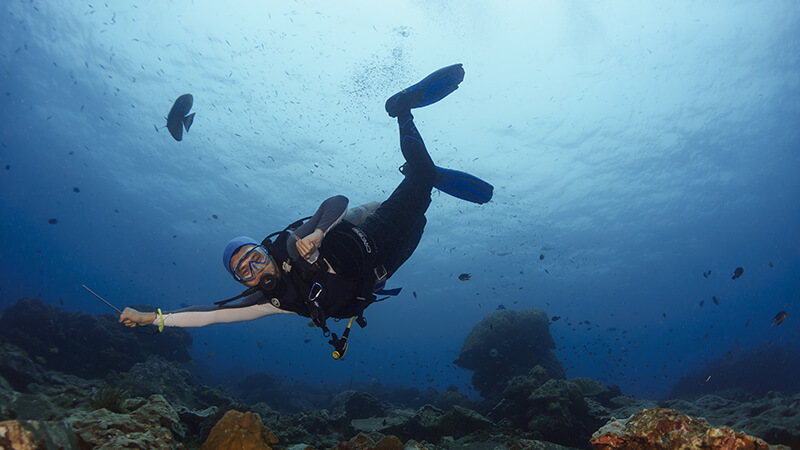
Decompression is the planned and timed release of the inert gases trapped in the body tissues. This happens because of breathing air at a higher pressure than you would breathe on the surface.
Decompression is the act of ascending to a given level and holding your dive there for some time. This allows the body to release all the nitrogen that was absorbed in the cells.
The safest depth that you can dive for hours without need for a decompression stop is 6 meters or 20 feet.
Deep sea diving
Deep sea diving is the deliberate act of diving in the open water using a breathing assistance apparatus. It is also defined as diving to depths that are out of the normal depths. The diving communities set out the so-called normal depths for diving.
With the right apparatus – dry diving suits, scuba tank, scuba diving gloves and others, a technical diver can descend to more than 1000 feet. The diving community says that with an atmospheric suit, it is possible to dive to 2000 feet.
How deep can a human dive with scuba gear?
diving is without doubt one of the most exciting water sports. Hopefully, this information has helped you find the answer to the question of: how deep can a human dive with scuba gear. For the sake of your own safety, make sure that you stick to the recommended depths. Whenever you are diving, ensure you have the right equipment for diving. Take it a little at a time, keep advancing your diving course and who knows… eventually, you could be like Ahmed Gabr.

